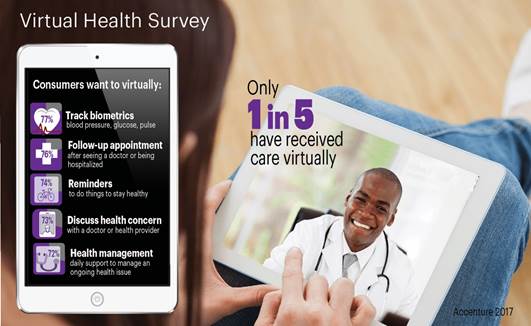 The gulf between how many Americans say, in a survey, that they would like to use digital health services and how many actually have is still quite large, according to a new survey from Accenture. The consulting firm reached out to 1,501 US consumers and found that, while 78 percent were interested in receiving care virtually, only 21 percent had actually done so.
The gulf between how many Americans say, in a survey, that they would like to use digital health services and how many actually have is still quite large, according to a new survey from Accenture. The consulting firm reached out to 1,501 US consumers and found that, while 78 percent were interested in receiving care virtually, only 21 percent had actually done so.
Accenture defines virtual care as encompassing telemedicine, biometric tracking, and the use of apps for reminders and health management. Seventy-seven percent of respondents said they would like to to track health indicators such as blood pressure, pulse and glucose levels with technology, 76 percent wanted to use telemedicine for follow-up appointments, and 70 percent wanted to be remotely examined for non-urgent health concerns.
“Consumers are clear: In the 21st century, 20th century healthcare is not good enough,” Frances Dare, managing director of Accenture’s virtual health services, said in a statement. “Technology-enabled services will be equally important as traditional in-person services, allowing the modern patient to choose when and how they receive health and care services.”
Asked why they turn to virtual care, 37 percent attributed it to convenience, while 34 percent said curiosity and 34 percent said it was because they were already familiar with the use of technology.
Backing up previous studies that have shown the impact of physician recommendations, 44 percent of respondents said they would be more likely to try virtual care if their physician recommended it. Only 31 percent said the same thing about their health insurer.
“Given evolving consumer attitudes toward virtual care, making virtual health a priority could be a boon for provider organizations that are resource- and finance-constrained,” Dare added. “As more and more patients take control of their own healthcare in the age of consumerism, provider organizations must be able to offer meaningful choices for virtual care, in-person care and a combination of both.”
It’s hard to meaningfully compare different surveys that used slightly different definitions of digital health, telehealth, or virtual care, but the 21 percent adoption number is high compared to a study of physicians last year, which found that 15 percent had used telehealth, or a 2015 Healthline survey that found just 9 percent of consumers had used telehealth.













